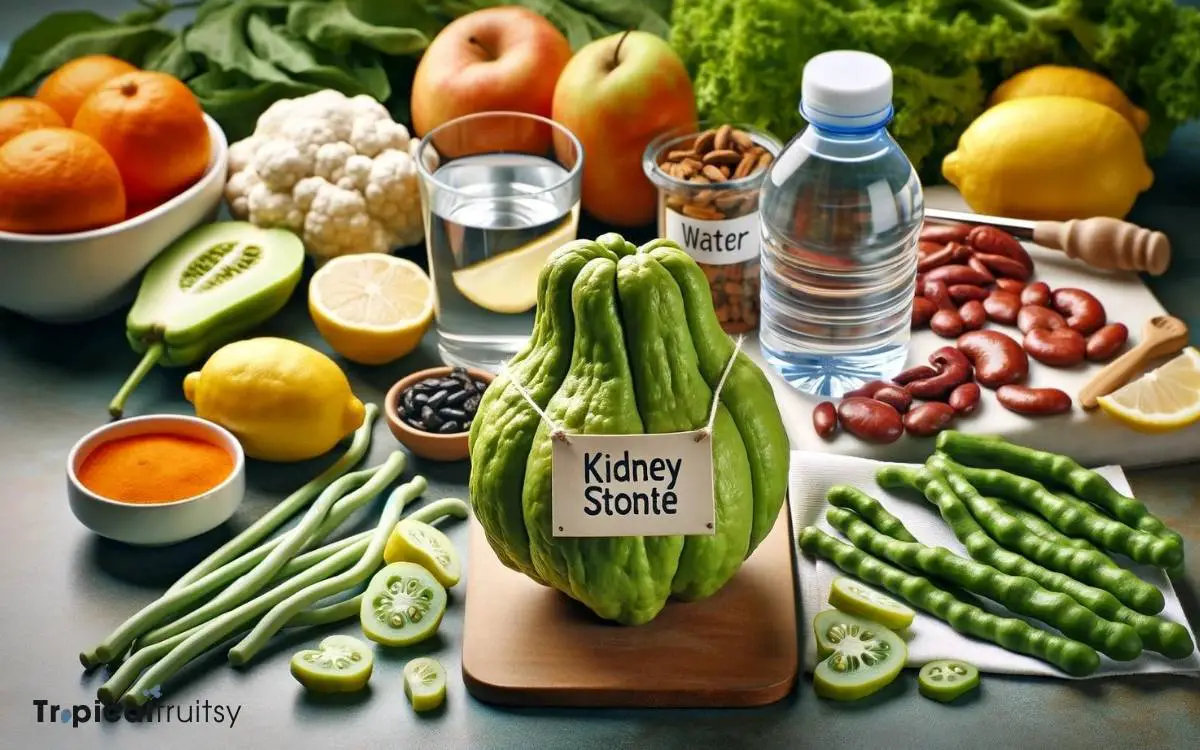Is Chayote Good for Kidney Stones? Unlocking Kidney Health!
Chayote, also known as mirliton or vegetable pear, may have potential benefits for individuals with kidney stones due to its high water content and nutrient composition.
While no specific studies have directly linked chayote to kidney stone prevention, the vegetable’s hydrating properties and content of certain vitamins and minerals, such as vitamin C and magnesium, could contribute to reducing the risk of stone formation.
Including chayote as part of a balanced diet with ample fluids might be beneficial for kidney health.
The role of chayote in kidney stone prevention can be understood through its nutritional profile:
Chayote’s hydrating effect and nutrients make it a possible ally in kidney stone prevention.

Key Takeaway
Nutritional Composition of Chayote and Its Benefits for Kidney Stones
| Nutrient | Amount in 100g of Chayote | Potential Benefit for Kidney Stones |
|---|---|---|
| Water | 94.6g | Increases urine volume to prevent stones |
| Vitamin C | 7.7 mg | May decrease oxalate stone formation |
| Magnesium | 12 mg | Inhibits crystal aggregation |
| Dietary Fiber | 1.7g | Aids in overall kidney function |
| Potassium | 125 mg | Helps prevent stone formation |
| Calcium | 17 mg | Balances with oxalate to reduce stones |
Understanding Kidney Stones
Kidney stones are hard mineral deposits that form in the kidneys and can affect any part of the urinary tract. These crystalline formations are typically composed of calcium oxalate, uric acid, struvite, or cystine and can vary in size.
They may cause severe pain, urinary obstruction, and lead to chronic kidney diseases if not managed properly.
From a nutritional standpoint, dietary factors play a significant role in stone formation and prevention. Adequate hydration is crucial, as it dilutes urine, reducing the concentration of stone-forming substances.
Furthermore, certain dietary choices can influence urinary pH and solute load, thereby impacting stone risk. For example, a diet high in sodium or oxalates and low in citrate can increase the likelihood of stone formation.
Chayote Nutritional Profile
The chayote, a type of squash, offers a unique nutritional profile that may influence kidney stone formation due to its low oxalate content and high water composition.
Rich in essential vitamins and minerals, chayote contains vitamin C, which is crucial for immune function, and vitamin B6, known for its role in amino acid metabolism. It also provides dietary fiber, which can aid in digestive health.
Importantly for kidney stone prevention, chayote has a high water content, promoting hydration that is beneficial for kidney health.
Additionally, it is a source of magnesium, which has been linked to a decreased risk of kidney stone formation. The presence of potassium in chayote helps to maintain electrolyte balance, further supporting kidney function.
Chayote’s Role in Kidney Health
Chayote consumption contributes positively to renal function, offering properties that may help prevent the crystallization processes leading to kidney stones.
The vegetable is rich in essential nutrients and holds a high water content, which is beneficial for promoting hydration and kidney health.
Here are key aspects of chayote that may aid in the prevention and management of kidney stones:
- High Water Content: Enhances hydration, which is crucial for diluting urine and reducing stone formation.
- Rich in Magnesium: Magnesium can inhibit stone formation by binding with oxalate in the urine.
- Low Oxalate Levels: Lowers the risk of calcium oxalate stone development.
- Source of Antioxidants: Helps combat oxidative stress, which is linked to kidney stone pathogenesis.
Adopting a diet inclusive of chayote may offer a natural adjunctive approach to maintaining renal health and preventing kidney stone formation.
Scientific Evidence Reviewed
Frequently, scientific studies have supported the role of chayote in kidney stone prevention, highlighting its beneficial properties through empirical research.
These studies often examine the fruit’s diuretic effects, its richness in antioxidants, and its potential to modulate urinary pH, which can be factors in stone formation.
Below is a table summarizing key findings from recent studies:
| Study Focus | Key Findings | Implication for Kidney Stones |
|---|---|---|
| Diuretic Properties | Chayote increases urine output | May prevent stone consolidation |
| Antioxidant Capacity | High in vitamin C and flavonoids | Protects renal tissue |
| Urinary pH Modulation | Alters urine composition favorably | Reduces risk of stone formation |
Dietary Considerations for Prevention
Incorporating chayote into one’s diet, alongside other preventive measures, may significantly contribute to reducing the incidence of kidney stones.
From a nutritional standpoint, certain dietary considerations are paramount in preventing the formation of these painful crystals.
- Hydration: Consuming ample fluids, particularly water, helps dilute the urine, mitigating stone formation.
- Calcium Intake: Adequate dietary calcium can reduce oxalate absorption, a common component of kidney stones.
- Moderate Oxalates: Foods high in oxalates, such as certain leafy greens and nuts, should be consumed in moderation.
- Balanced Diet: Embracing a diet with a variety of fruits, vegetables, lean proteins, and whole grains promotes overall kidney health.
Understanding the role of chayote in this dietary framework sets the stage for exploring how to incorporate it into your diet effectively.
Incorporating Chayote Into Your Diet
Regularly including chayote in meal planning can be an effective strategy to enhance your diet with its kidney stone-preventing benefits.
Chayote, scientifically known as Sechium edule, is a low-calorie vegetable rich in water and fiber, which can be beneficial for hydration and reducing the concentration of minerals that form kidney stones.
Its consumption may aid in maintaining a balanced urine pH, thereby minimizing the risk of stone formation. Additionally, chayote is a source of antioxidants and vitamins, particularly vitamin C, which supports overall kidney health.
To incorporate chayote into the diet, consider adding it to salads, stews, or as a steamed side dish.
Its mild flavor and crisp texture make it versatile for integration into various culinary preparations, providing a nutritional boost with potential renal health advantages.
Conclusion
Chayote, with its low oxalate content and high water content, may be beneficial for individuals managing kidney stones.
Statistically, a high intake of fluids is associated with a 40-60% reduction in kidney stone risk, highlighting the importance of hydrating foods in the diet.
As part of a comprehensive dietary strategy, chayote can contribute to kidney health, though further research is essential to fully understand its role in kidney stone prevention and management.





